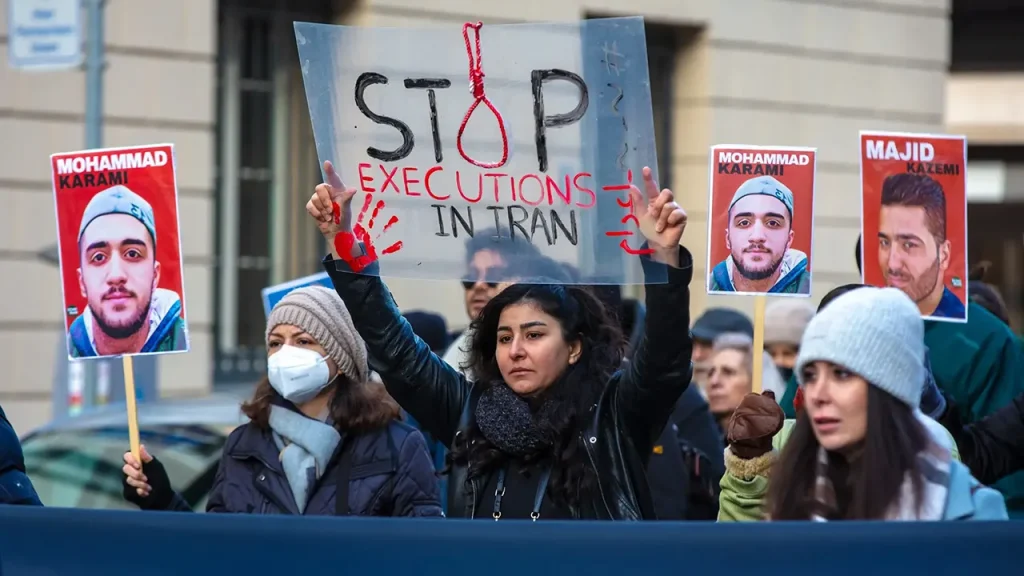Iran’s Execution Crisis: A Nation Gripped in Fear
In a harrowing development, the United Nations has described the Iranian regime as being on an “unprecedented execution spree,” with the Office of the High Commissioner for Human Rights (OHCHR) reporting that the Islamic Republic has carried out more than 1,000 executions since the start of 2024. The pace is staggering—as many as nine executions each day—primarily targeting individuals accused of murder and drug-related crimes. This alarming rate represents not just statistics, but human lives systematically ended by a state apparatus that has increasingly turned to capital punishment as a means of control and intimidation. Behind these numbers lie families devastated by loss, communities living in fear, and a justice system that many international observers consider deeply flawed and prone to extracting confessions through torture and conducting sham trials that fall far short of international standards.
The situation has become so desperate that approximately 1,500 Iranian prisoners on death row in Ward 2 of Ghezel Hesar Prison took the extraordinary step of launching a hunger strike on October 13. Among these prisoners are 17 members of the Iranian dissident organization Mojahedin-e-Khalq (MEK), highlighting the political dimension of many executions. “Our patience has run out over this endless oppression and the taking of the lives of prisoners and young people,” the striking prisoners stated in an exclusive message to Fox News Digital. “Every day and every week, some of our cellmates are sent to the gallows, and many of us spend our nights in the nightmare of death. These are the most agonizing moments of our lives and of our families. We demand the abolition of the death penalty in Iran.” Their words paint a vivid picture of the psychological torture endured by those living under constant threat of execution, where each day might be their last, and where sleep is haunted by the specter of the gallows.
The hunger strike has rapidly spread beyond its original confines, now reaching Wards 1 and 4 in Ghezel Hesar Prison and extending to the infamous Evin Prison, known internationally for its harsh treatment of political prisoners. According to the National Council of Resistance of Iran (NCRI), prison officials have been attempting to break the strike and have even shared footage of prisoners in Ward 3 eating food to “falsely claim that there is no hunger strike in Ward 2″—a desperate attempt to control the narrative as international attention grows. The NCRI spokesperson also revealed that Iran had previously executed two MEK members on July 27 and has yet to return their bodies to their families, adding another layer of cruelty to the regime’s treatment of the executed and their loved ones, who are denied even the basic dignity of proper burial and mourning rituals.
Far from slowing down, the pace of executions has reportedly accelerated in recent days, with the NCRI telling Fox News Digital that 38 executions took place in just three days between October 13 and October 15. This brutal efficiency has driven “the number of executions during the 14½ months of [Masoud] Pezeshkian’s presidency” to “an unprecedented record of 2,008 prisoners.” This staggering figure challenges any notion that the election of Pezeshkian, sometimes characterized as a moderate, would lead to meaningful human rights improvements in Iran. Instead, his tenure has coincided with what appears to be an intensification of the state’s use of capital punishment, raising questions about the structural nature of human rights abuses in Iran regardless of which individual holds the presidency, given the ultimate authority of Supreme Leader Ali Khamenei.
The international response to this crisis has been mixed. Maryam Rajavi, the president-elect of the NCRI, has called “for immediate action by the United Nations, U.N. Security Council members, the European Union, and international human rights organizations to end this horrific nightmare in Iran under the rule of the criminal mullahs.” Iranian prisoners themselves have appealed directly to U.N. Secretary-General António Guterres to speak out and intervene on their behalf. A State Department spokesperson told Fox News Digital, “We strongly condemn the Iranian regime’s use of executions to kill people for exercising basic human rights, including peacefully protesting for a better life,” adding that “for decades, Iranians have been subjected to torture and sham trials resulting in executions and other severe punishments, often with those coerced confessions as the only evidence presented against them.” The spokesperson promised continued efforts to hold the Iranian regime accountable and ensure “it faces severe consequences for its heinous acts.”
Despite these strong words from various international actors, questions remain about the effectiveness of the global response, particularly after the U.N. Human Rights Council drew widespread condemnation earlier this month for electing Iran to its advisory committee—a move that many see as undermining the credibility of international human rights mechanisms. Stéphane Dujarric, a spokesman for Guterres, told Fox News Digital, “We stand firmly against and continue to condemn the use of the death penalty in Iran, and anywhere else in the world,” but such statements, while morally clear, have yet to translate into tangible action that might slow or halt the execution crisis. As the hunger strikes continue and the execution toll rises, the international community faces a critical test of its commitment to universal human rights principles and its willingness to move beyond condemnation to effective intervention. For those awaiting execution in Iran’s prisons, the clock is ticking, and each day of international hesitation could mean more lives lost to a system that increasingly relies on the gallows as an instrument of state power.


